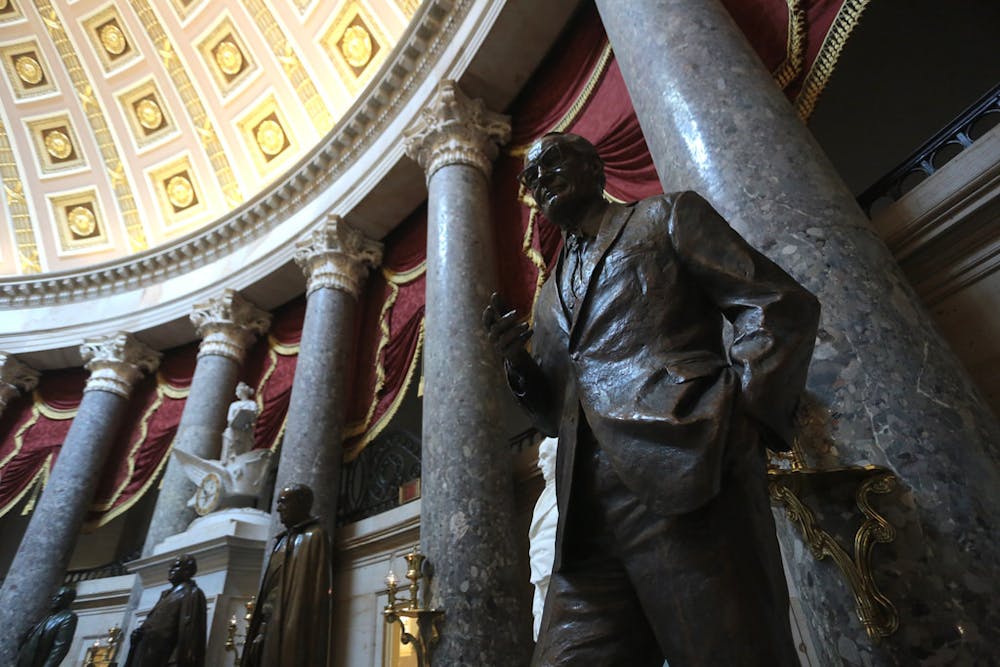Hopkins juniors Christopher Anchan, Sai Chandan Reddy and Sarah Syed were all awarded the 2022 Goldwater Scholarship on March 25. The scholarship is a partnership between the National Defense Education Programs and the Barry Goldwater Scholarship and Excellence in Education Foundation.
For the 2022–23 academic year, 417 students were granted Goldwater Scholarships from a pool of over 5000 students. These scholarships honor students pursuing research careers in the natural sciences, engineering and mathematics.

COURTESY OF CHRISTOPHER ANCHAN
Anchan is a junior Biophysics major with a minor in Mathematics. In an interview with The News-Letter, he described his research experience. Since high school, he has conducted summer research at Brigham and Women’s Hospital with Dr. Thomas McElrath on using stem cells to model placentation.
“That involves a lot of cell migration processes - how do cells move from one place to the other and how they invade the uterine wall,“ he said.
At Hopkins, he does research with Brian Camley in the Thomas C. Jenkins Department of Biophysics, where he uses mathematical models to understand how clusters of cells interact with stimuli in the environment.
He is currently applying for MD/PhD programs in biophysics or biological chemistry, where he hopes to study neurodegeneration and protein folding.

COURTESY OF SAI CHANDAN REDDY
Sai Chandan Reddy is a junior Neuroscience and Chemistry double major. As part of the University’s Worley lab, he currently studies depression-related mouse models and treatments for depression, such as ketamine. Chandan Reddy plans to pursue an MD or MD/PhD with a focus on neuroscience and Alzheimer’s research.
Syed is a junior Neuroscience major interested in cellular and molecular neuroscience. She does research at the University’s Watanabe Lab and the University of Michigan’s Cai Lab.
In an interview with The News-Letter, she explained that she began doing research during the summer before her senior year of high school.
“It was really what opened my eyes to research,“ she said. “It’s one thing to read about research happening in textbooks but to really have the chance to work through these processes and see a result at the end of the day is [rewarding].”

COURTESY OF SARAH SYED
Syed has worked on three projects with the Watanabe Lab, including the alignment of receptors and release sites for neurons, biophysical modeling of axons and the role of microglia in brain diseases. She is particularly interested in researching microglia, a type of glial cell in the nervous system.
“These cells have been considered helper cells of neurons for a long time, and they’ve been cast aside and left in the shadows,“ she said. “More people are realizing that these cells are really important to the functioning of the human body.”
At the Cai Lab, Syed researches the single-cell RNA sequencing pipeline, where she focuses on the computational aspect of the research.
The students expressed gratitude to their mentors for encouraging them to pursue their respective research projects and apply to the Goldwater Scholarship.
“This award is not just for me,” Chandan Reddy said. “It reflects well on a lot of people who helped me get here.”
Syed emphasized the importance of mentorship in her research career, especially in writing grants and submitting her application.
“This really is an homage to the belief that [my mentors] had in me,” she said.
Anchan, Chandan Reddy and Syed each explained that the intensive application process for the Goldwater Scholarship required significant self-reflection.
The application process included several steps. First, Hopkins nominated the four students, who then had to compete in the national scholarship competition. They had to submit recommendation letters, a transcript and a research essay as part of their application.
Syed noted that for the national competition, students only had one week to write the essay.
“It was a good challenge and I’m glad that I had the chance to sort out some of the ideas that I was mulling around in my head in terms of why [I want to pursue an] MD/PhD,” she said.
Anchan encouraged students to apply to the Goldwater scholarship.
“The worst thing that can happen is you don’t win it,“ he said.





